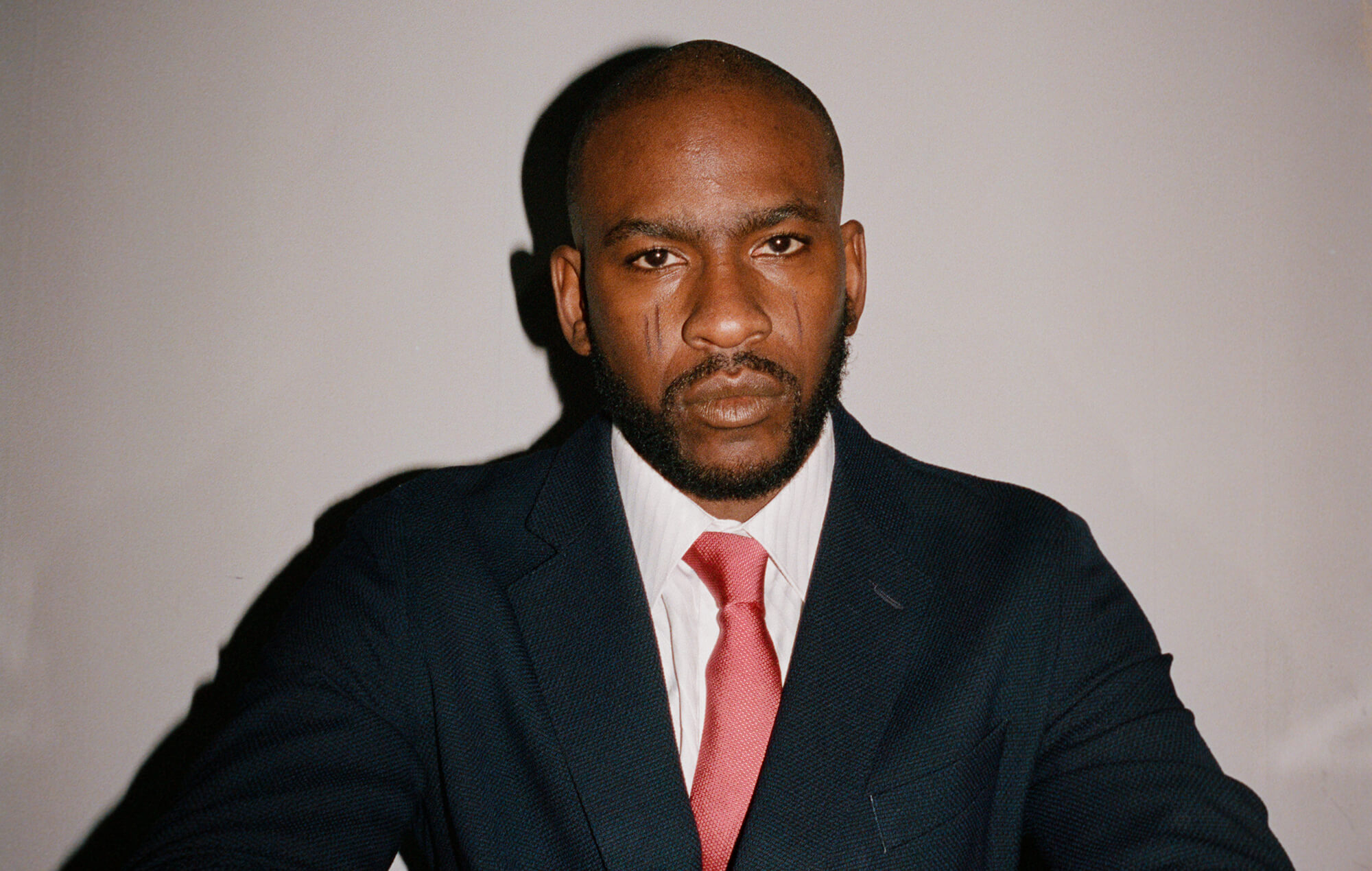Skepta, one of the architects of grime’s unstoppable entry into the mainstream, is singing Pet Shop Boys to NME. Dressed in a suit and tie that he’s capped off with a black bucket hat, surrounded by a large entourage, he’s hazily recalling the NME Awards 2017, when he was crowned Best British Male and spent much of the night careering around O2 Academy Brixton with a bottle of Jameson in hand.
“Yeah, that was a good night,” purrs the man born Joseph Adenuga Jr. “That was one of my favourite awards, though. There was just something about it that felt real. I love NME, man.”
Pet Shop Boys took home the Godlike Genius award that year and closed the night with an eight-song setlist of pure pop perfection – and, naturally, Skepta’s grime crew Boy Better Know were right down the front. “Everyone thought it was gonna be a grime rave,” he chuckles, “but man’s going…” He trails off, stands and begins to belt out one of the UK’s campest anthems: “WEST END GIRLLLSSSSSS!”
Skepta on the set of ‘Tribal Mark’. CREDIT: 1PLUS1 Production
As the laughter dies down, he takes his seat – all that was missing from the performance was a small bow. It’s a surreal sight for anyone expecting the 41-year-old rapper to be the fearsome interviewee of lore, but Skepta has much to be jovial about at the dawn of 2024. This year sees the release of his long-gestating sixth album, ‘Knife And Fork’, as well as Tribal Mark, his debut film and the subject of our brief encounter.
We’re in the creative hub (read: a small room atop a flight of stairs in Soho) of his multi-faceted company Big Smoke Corporation. The aforementioned entourage largely consists of collaborators he worked with on Tribal Mark, the first film from his production company, 1PLUS1. Skepta co-directed the 24-minute short with his cousin Dwight Okechukwu – who’s in attendance today and exudes a similarly genial demeanour – alongside veteran music video director Hector Dockrill.
The story of Tribal Mark, which Okechukwu and Skepta came up with before outsourcing the script, follows Mark (played by Jude Carmichael), a young boy whose well-meaning family uproot him from their home in Nigeria in search of the proverbial ‘better life’ in London. It doesn’t quite work out that way: “Is the grass greener all the time?” Skepta asks today. A teenage Mark falls in with the wrong crowd, which leads him to a precipitous situation that we won’t spoil here. If it sounds like hard-hitting social realism, though, you’d only be half-right.
“Tribal Mark is our visual representation of what a Black gentleman is”
The movie was shot on location in Nigeria and London in a hyper-realistic art house style, all wobbly tracking shots and deliberately jagged jump-cuts, but is intended as the prelude to something even grander. The narrative charts Mark’s transformation into Tribal Mark (played by Skepta), a super-spy figure recognisable for the scarifications – two vertical lines on the right of his face, one on the left – that define his features from the start. Plans abound for a follow-up feature film with a more traditional action-adventure aesthetic, before the character spins off into the Tribal Mark cinematic universe; a franchise with endless possibilities.
“It’s like the Black James Bond thing that everyone was trying to do,” says Skepta (which seems to explain the suit – though you might struggle to recall 007 in a bucket hat). “We wanted to make something [where] after I’ve done the movie, I’m like, ‘OK, cool – it’s the franchise now.” At that point, he reasons, an actor such as Damson Idris can adopt those trademark scarifications and have his “Daniel Craig moment for a couple films… Just building that out so we have a hit-man spy, so we’re not leaning on James Bond all the time.”
Asked why he’d rather create Tribal Mark than, say, have a Black 007, Skepta deadpans: “’Cause… James Bond is white.”
With a little prodding, he warms to the point: “James Bond is almost the epitome of British gentleman, you know? A lot of white people must look at him and be like, ‘OK, I need my Aston Martin and my watch and I’m gonna be this guy.’ But we don’t have one. Going forward, we’re gonna be very thoughtful-minded about: ‘What car does Mark drive? What suit does he wear? Because this is gonna be our visual representation of what a Black gentleman is.”
Skepta and Idris Elba at the London premiere of ‘Tribal Mark’. CREDIT: 1PLUS1 Production
Skepta hopes young Black boys will look at his actual life, as well as that of his character, and understand that “the street life doesn’t have to end in prison or the grave”, and that certain hardships can be repurposed: “In the hood, some people think they can swindle you – they’re the same characters in business. I can spot them a mile off because we’ve lived it, but I’m just living it now in a corporate space. We want Mark to embody that. [Otherwise], all we’re thinking is that to be a gentleman we’ve gotta be like James Bond.”
Tribal Mark opens and closes with disclaimers that emphasise the fictitious nature of the film. This, explains Skepta, is because he advertised for a “young Skepta” while casting the movie, and didn’t want anyone to jump to conclusions: “I know that a Skepta biopic is something that people wanna see, innit, so I don’t want people to think this is my life… I’m ready: one day I wanna make the biopic, so I don’t want this to take the shine off that.”
It would certainly be something to tell your own story through your own production company. He smiles: “That would be fly. I would get to control the narrative.”
Still, there are parallels between his life and Tribal Mark’s. Skepta’s own mother, Ify, left Nigeria, where she lived through the country’s civil war, and moved to London in 1980. There she met Skepta’s father, Joseph Sr., a fellow Nigerian immigrant. The couple’s children – Julie, famed broadcaster and one-time NME Awards host; Jason, a graphic designer and artist; and Jamie aka rapper JME – went on to pursue such singular careers that The Guardian once asked: “Are the Adenugas Britain’s most creative family?”
“One day I wanna make the Skepta biopic”
Skepta and his siblings grew up on the Meridian estate in north London. “It was inbetween all these different areas,” he recalls, explaining that this gave them a unique perspective on the postcode wars that erupted on all sides. “Some people didn’t like them; they didn’t like them; they didn’t like them – but we knew everyone, you know?”
When his parents left for work each day, he’d come downstairs, open the front door and leave it that way: “People would be just walking in my house. I’d be making beats, I’d turn and there’s a new guy. I’d be like, ‘Yo – what’s up.’ Sometimes there’d be people in my house rolling, smoking. I’ve never met this person before, but they’re just chillin’. My house was that kinda space.”
This literal open-door policy was modelled on that of his father’s, who would invite “people from all cultures, walks of life” to party through the night and crash on the sofa. “On top of that,” Skepta reflects, “I think because I was the oldest child, throughout my life I always just wanna cultivate. I always wanna get everyone together and see what magic comes out of that melting pot.”
Skepta as hitman spy Tribal Mark. CREDIT: 1PLUS1 Production
It’s an attitude that defined the collaborative process behind Tribal Mark. Skepta, suggests Okechukwu, is a conduit for creativity: “He’s done so many different things [that] it’s like whatever we’re doing, we just believe in ourselves.” The movie, which has taken a couple of years to come to fruition, emerged from their shared reflections. “We would just be on the phone, innit,” says the rapper, “talking about life and how far we’ve come as people and how we think: the mental health, the trauma, the disassociation we have from our family backgrounds, but ultimately how it’s made us who we are today.”
He mined his own story for the scene that sees kids congregate at Mark’s house and another in which his mother berates him for socialising with someone who spells trouble; Ify expressed similar concerns about her eldest son. He describes the film as “a therapy movie”, adding: “It’s really hard to look back sometimes, but… I love looking into why I’m certain ways. Everyone’s going to be able to watch this and go, ‘Wow, OK, I get why I’m like this.’” In making Tribal Mark, he came to understand his parents a little better, too: “My mum was in the war. My dad was in the same space. They tried their best, innit, for a ‘better life’.”
Skepta’s directorial debut, as per its press materials, “features a 90 per cent minority ethnic cast and production team, a first of its kind in British cinema”. This, he says, came naturally: “The film chose those characters. It is a Nigerian story and we do have plans to make this a more immigrant story, a story about people who are living in a place where their parents are not from.”
The movie features numerous bird’s eye view shots of Nigerian food, while the new album’s title refers to “coming from a country where we eat with our hands – but the knife and fork is seen as something that’s like going up in the world”. What unites these twin projects, then, is that they navigate the gulf between the lives his parents left behind and the trappings of an award-winning London rapper.
“Right now,” Skepta says, “if someone brought out a plate of jollof and chicken, I’d be over the moon. But sometimes I’d starve myself to go to a fashion party with two knives on the right and two on the left. They bring out four pieces of asparagus with a little tangerine sitting on top. They think that I’m supposed to like this! It’s that juxtaposition of upper-echelon and living raw in Nigeria and showing that Mark… all he wants is a plate of jollof.”
‘Tribal Mark’ is in Everyman Cinemas until February 11. Tickets will be discounted to £13 to ensure accessibility for all communities to enjoy
The post Skepta on his new spy film: “Why not have a Black 007? ‘Cause James Bond is white” appeared first on NME.




